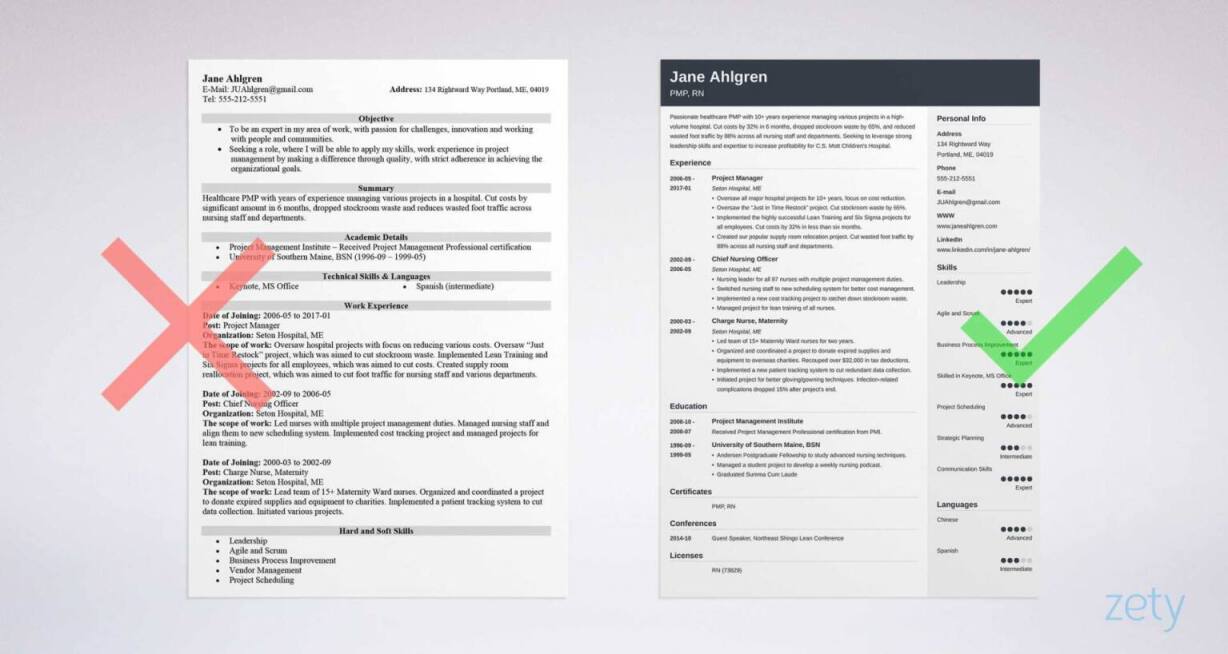References on a CV: Should You Include Them?
Create your CV nowYour CV references are people, called referees, who can vouch for your character, skills and experience to potential employers. Consider your referees as your personal brand ambassadors, ready to promote your best-selling points as a candidate. The employer may call them or write to them requesting information about you.
So yes, they’re incredibly important, but you don’t usually need to put references on your CV when you send out your job application. Here’s why.
Want to save time and have your CV ready in 5 minutes? Try our CV builder. It’s fast and easy to use. Plus, you’ll get ready-made content to add with one click. See 20+ CV templates and create your CV here.
Sample CV made with our builder—See more CV examples here.
Here’s some advice on what you do need to include on your CV:
- How to Write a CV [Professional UK Examples]
- 20+ Job Winning CV Tips and Advice
- Best CV Format for Job Hunting Success
- CV Layout [5 Professional Examples]
- How to Write a CV Personal Statement [CV Profile Examples]
- Key Skills to Put on a CV [Best List of CV Skill Examples]
- Most Professional CV Fonts
1. Should I Put References on my CV?
No, you should not put references on your CV. It used to be common practice in the past. Two references used to be the norm or alternatively you’d write references available on request. However, in recent years this is no longer the case. So what’s changed?
References Aren’t Required This Early in the Recruitment Process
References are only needed right at the very end of the recruitment process. Today, it’s normal to go through multiple interview and assessment stages. Then you’re given an offer and only when you’ve accepted it do, your references be requested.
References are simply unnecessary so early on. What’s more, in today’s data protection minded world, it’s not good form to circulate someone’s personal info to each and every job application you make. Do you really want them getting spammed or cold called by an unscrupulous recruiter?
Providing Your References Later Leaves Your Options Open
Once you’ve completed the recruitment process through interviews and assessments you’ll have a better feel for the company and the role. This could influence your choice of referee. Different people could work better for different purposes.
If you’ve provided them already, then you’ve painted yourself into a corner. Play it strategically and wait until you’ve got a good feel for who would work best.
Don’t Waste Precious Space With References
The best page length for your CV is no more than two pages. Page space is as valuable as property in Central London. You don’t want to be wasting that space with CV references. Why?
There are 118 people competing for every job. Every word of your CV needs to make you look better than the competition. Those couple of lines can be better used detailing your skills, knowledge and experience. It could just be the little bit extra that’ll tip you into the yes pile.
And definitely don’t include references available on request in your CV. Why waste space by stating the obvious? Of course you’ll give references when they’re requested. Stick to what matters, filling your CV with interview-winning content.
There is an exception though. In the rare case a job advert specifically asks you to provide CV references, then do include them. Here’s how.
Read more: What to Include in a CV
3. How to Write References on a CV
Here's how to list professional references on a CV:
- List each referee’s full name.
- Mention their professional title.
- Name the company/organisation they work for.
- For contact details, include their phone number.
- Also add their email address.
- Include your CV references as the very last section of your CV.
- Always ask your referees’ permission before you give out their details. This will also prepare them to be contacted.
- Ask your referees which contact details they want given. They might not want their personal number disclosed.
And here’s how it should look.
References on a CV Example
References
- Ms Jennifer Hughes, Area Manager, Sunco Ltd. Phone: 0777 777 7777 Email: j.hughes_zety@sunco.co.uk
- Mr Sunil Gupta, Senior Lecturer, University of Middlesex. Phone: 0777 777 7777 Email: sunilg_zety@gmail.com
It’s that simple! Note that there’s no need to include a postal address. It’s for the same reason there’s no need to include your own address on your CV. Nobody makes contact through the post anymore. Sorry Royal Mail.
So who can be a reference? Let’s find out.
Making a CV with our builder is incredibly simple. Follow our step-by-step guide, use ready-made content tailored to your job and have a CV ready in minutes.
When you’re done, Zety’s CV builder will score your CV and tell you exactly how to make it better.
4. Who to Use as a Reference on Your CV
Make sure you choose the right people to act as referees. They’ve got to be able to vouch for you in a professional and effective manner. You should choose two. At least one should be someone you’ve worked with, preferably in a role senior to you like a supervisor or manager.
The second can be someone who knows you well and can speak highly of your strengths. If you’re writing a student CV or a graduate CV, then a teacher or lecturer would be a good choice.
Don’t use family or friends, the idea is to get an unbiased view and this would defeat the purpose. Plus it doesn’t exactly look professional having your Uncle Bert regale the recruiter with tales of how lovely you were as a child. Here are some ideas of who would work.
Job referee examples
- Current employer
- Previous employer
- Manager
- Supervisor
- Teacher
- Lecturer
- Coach
- Customers/clients you’ve dealt with regularly
- Someone who can vouch for your skills through community or volunteer work
Your referees should be:
- Well-spoken and good communicators
- Friendly and engaging
- Authoritative and professional
And always check with your intended reference before using them. Confirm you’ve given their preferred contact details and let them know if they can expect to be contacted.
Pro Tip: Only include your current employer in situations where references have been requested after a solid offer of employment. You don’t want them being contacted unless you’ve got an acceptable offer on the table. Then at this stage it’s best practice to let them know you’ve been given an offer and that you intend to use them as a referee.
Plus, a great cover letter that matches your CV will give you an advantage over other candidates. You can write it in our cover letter builder here. Here's what it may look like:
See more cover letter templates and start writing.
Key Takeaways
Do you put references on a CV? The conclusion is simple.
- You don’t need to list references on your CV unless specifically requested by the employer.
- Likewise, there’s no need to write references available on request, it’s a waste of space and stating the obvious.
- When you do give references, choose your referees carefully. Make sure they can convincingly promote your best strengths as a candidate.
- And always follow good etiquette and check with the referee before you use them.
And that’s it! Thanks for reading.
About Zety’s Editorial Process
Our editorial team has thoroughly reviewed this article to ensure it follows Zety’s editorial guidelines. Our dedication lies in sharing our expertise and providing you with actionable career advice that offers you real value. Every year, the quality of our content attracts 40 million readers to our site. But that’s not all – we conduct original research to gain a detailed understanding of the labour market. We take pride in being cited by top universities and leading media outlets in the UK and worldwide.






